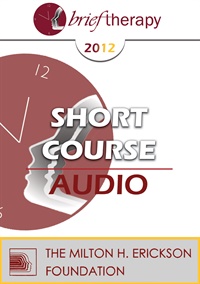
- Average Rating:
- Not yet rated
- Topic Areas:
- Trance | Trauma | Short Courses | Mindfulness | Hypnosis
- Categories:
- Brief Therapy Conference | Brief Therapy Conference 2012
- Faculty:
- Ronald Alexander, PhD
- Duration:
- 1:29:32
- Format:
- Audio Only
- Original Program Date:
- Dec 09, 2012
- Short Description:
- BT12 Short Course 30 – Mindfulness, Trauma, and Trance: Ericksonian Brief Solutions: A Mind/Body Approach – Ronald Alexander, PhD This course will address the rapid treatment of trauma by utilizing both Mindfulness practice and Ericksonian orientation. The course will highlight Milton Erickson’s use of storytelling, metaphor and rapid trance induction as well as the use of mindfulness practice for framing, re-framing and de-framing the immediate reorganization of transforming somatic-affective experience into new healing rhythms in the body. These methods allow the body to open healthier pathways for new somatic recoveries. We will also emphasize the use of naturalistic hypnotic trance, guided mindfulness practice, and healing metaphors for generating new therapeutic skills in mindbody healing therapies.
- Price:
- $15.00 - Base Price
Tags: Mind-Body Mindfulness
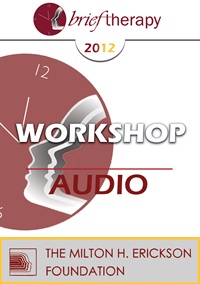
- Average Rating:
- Not yet rated
- Topic Areas:
- Trauma | Workshops | Multicultural
- Categories:
- Brief Therapy Conference | Brief Therapy Conference 2012
- Faculty:
- Kenneth Hardy, PhD
- Duration:
- 2:59:14
- Format:
- Audio Only
- Original Program Date:
- Dec 08, 2012
- Short Description:
- BT12 Workshop 23 – Understanding & Treating the Invisible Wounds of Socio-Cultural Trauma – Kenneth Hardy, PhD This workshop will provide a Socio-cultural view of trauma, highlighting the dynamics of the intersection of oppression and trauma. Strategies for effectively engaging and treating individuals and families with ‘oppression trauma’ will be discussed. Relevant Self of the Therapist issues will be explored.
- Price:
- $15.00 - Base Price
Tags: Multi-Cultural Trauma
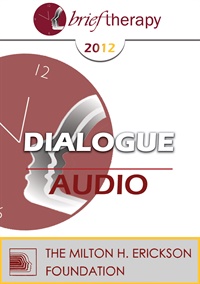
- Average Rating:
- Not yet rated
- Topic Areas:
- Trauma | Dialogues
- Categories:
- Brief Therapy Conference | Brief Therapy Conference 2012
- Faculty:
- Peter Levine, PhD | Ronald Siegel, PsyD
- Duration:
- 1:00:20
- Format:
- Audio Only
- Original Program Date:
- Dec 07, 2012
- Short Description:
- BT12 Dialogue 01 - Trauma - Peter Levine, PhD, Ronald Siegel, PsyD Educational Objectives: Given a topic, describe the differing approaches to psychotherapy, and identify the strengths and weaknesses of each approach.
- Price:
- $15.00 - Base Price
Tags: Trauma
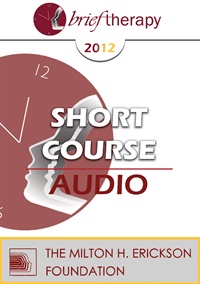
- Average Rating:
- Not yet rated
- Topic Areas:
- Family Therapy | Trauma | Short Courses | Family Constellations
- Categories:
- Brief Therapy Conference | Brief Therapy Conference 2012
- Faculty:
- Dan Booth Cohen, PhD
- Duration:
- 1:21:58
- Format:
- Audio Only
- Original Program Date:
- Dec 05, 2012
- Short Description:
- BT12 Short Course 16 – Systemic Family Constellations: A Broken Heart Can Heal…Sometimes in One Beat – Dan Booth Cohen, PhD, MBA This process identifies and releases transgenerational trauma. This simple process consistently uncovers connections between present day issues and transgenerational traumas. Within a single session, the burden of memory is transformed into an enduring source of strength and healing.
- Price:
- $15.00 - Base Price
Tags: Trauma
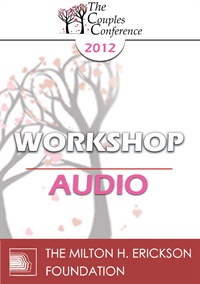
- Average Rating:
- Not yet rated
- Topic Areas:
- Workshops | Communication | Couples Therapy | Narcissism | Personality Disorders | Trauma
- Categories:
- Couples Conference | Couples Conference 2012
- Faculty:
- Ellyn Bader, PhD
- Duration:
- 1:01:18
- Format:
- Audio Only
- Original Program Date:
- Apr 28, 2012
- Short Description:
- Couples come to therapy saying “we can’t communicate.” It sounds simple. Yet what does this really mean? Closer examination often reveals trauma, chronic hostility, narcissistic entitlement, or long-term conflict avoidance. And resolution requires internal self-development that may be resisted by one or both partners. This advanced workshop will use video segments to demonstrate the intricacies of resolving predictable communication breakdowns and supporting couples development.
- Price:
- $15.00 - Base Price
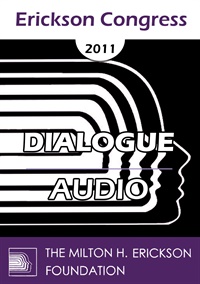
- Average Rating:
- Not yet rated
- Topic Areas:
- Trauma | Dialogues
- Categories:
- Erickson Congress | Erickson Congress 2011
- Faculty:
- Steve Andreas, MA, NLP | Danie Beaulieu, PhD
- Duration:
- 55:42
- Format:
- Audio Only
- Original Program Date:
- Dec 10, 2011
- Short Description:
- IC11 Dialogue 01 – Trauma – Steve Andreas, MA and Danie Beaulieu, PhD
- Price:
- $15.00 - Base Price
Tags: Trauma
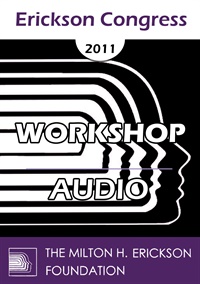
- Average Rating:
- Not yet rated
- Topic Areas:
- Trauma | Workshops | Pain and Healing | Somatic Experiences | Energy Psychology | Mindfulness | Neuroscience | Ericksonian Hypnosis and Therapy Techniques | Psychology
- Categories:
- Erickson Congress | Erickson Congress 2011
- Faculty:
- Maggie Phillips, PhD
- Duration:
- 59 Minutes
- Format:
- Audio Only
- Original Program Date:
- Dec 07, 2011
- Short Description:
- The single reason most people don’t recover from pain is related to unresolved trauma. This workshop will present efficient, effective ways to develop cooperative partnership with somatic experience to create lasting comfort, balance in the nervous system, and healing of past trauma. Techniques are drawn from , neuroscience, Somatic Experiencing,™ Ericksonian principles, mindfulness, and Energy Psychology to provide a cohesive, multi-modal approach.
- Price:
- $20.00 - Base Price
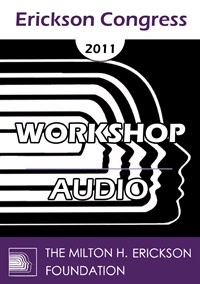
- Average Rating:
- Not yet rated
- Topic Areas:
- Trauma | Trance | Workshops | Mindfulness | Ericksonian Hypnosis and Therapy Techniques | Metaphors | Resources | Storytelling | Reframing
- Categories:
- Erickson Congress | Erickson Congress 2011
- Faculty:
- Ronald Alexander, PhD
- Duration:
- 59 Minutes
- Format:
- Audio Only
- Original Program Date:
- Dec 07, 2011
- Short Description:
- This workshop will address the rapid treatment of trauma by utilizing both Mindfulness practice and Ericksonian orientation’s that understand the importance of the symptom as a pathway to inner healing. We will review the clinical skills of tracking, pacing and utilization of the symptom for accessing the un-conscious and inner resources with mindfulness and trance. The workshop will highlight Milton Erickson’s use of storytelling, metaphor and rapid trance induction as well as the use of mindfulness practice for framing, reframing and de-framing for the immediate reorganization of transforming somatic-affective experience into new healing rhythms in the body.
- Price:
- $20.00 - Base Price
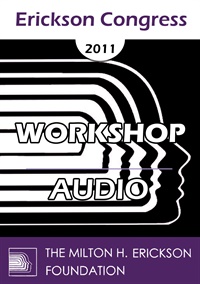
- Average Rating:
- Not yet rated
- Topic Areas:
- Trauma | StoryPlay | Workshops | Children and Adolescent Therapy | Metaphors | Storytelling | Art and Creativity
- Categories:
- Erickson Congress | Erickson Congress 2011
- Faculty:
- Joyce Mills, PhD, LMFT
- Duration:
- 59 Minutes
- Format:
- Audio Only
- Original Program Date:
- Dec 07, 2011
- Short Description:
- With the neuro-healing power of metaphor, creativity and play at its center, this experiential training presents StoryPlay® ; an Ericksonian, resiliency-based, indirective process that interweaves cultural diversity and natural healing abilities, to effect transformational change for children and adolescents who have experienced trauma and adversity.
- Price:
- $20.00 - Base Price
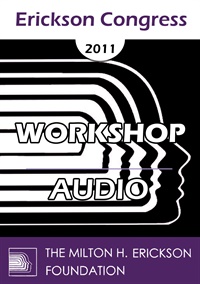
- Average Rating:
- Not yet rated
- Topic Areas:
- Psychotherapy | Grief | Workshops | Post-Traumatic Stress Disorder (PTSD) | Trauma
- Categories:
- Erickson Congress | Erickson Congress 2011
- Faculty:
- Woltemade Hartman, PhD
- Duration:
- 1 hour
- Format:
- Audio Only
- Original Program Date:
- Dec 07, 2011
- Short Description:
- Traditional intervention strategies to overcome traumatic grief reactions have in the past failed to achieve successful treatment outcomes. Dysregulation of affect and other central symptoms of acute stress disorder and PTSD are often the result of dissociative reactions to cope with the traumatic loss. This workshop will focus on grief as a resource, methods to facilitate the containment and transmutation of negative affect and how to integrate the deceased as an internal resource.
- Price:
- $20.00 - Base Price
Tags: Grief Psychotherapy PTSD Trauma
Please wait ...

